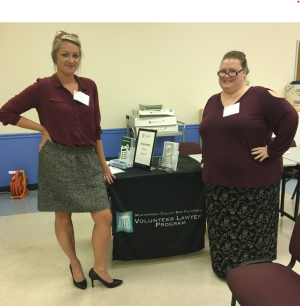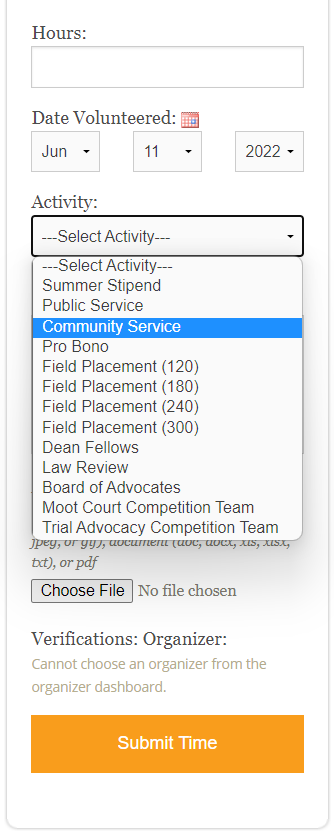Law School Tracks Public Interest Program Service Hours with Milestones
Milestones
Multiple Admins
Custom Hours Logs
Law School Tracks Public Interest Program Service Hours with Milestones
Faulkner University’s Jones School of Law is a private, ABA accredited law school that was founded in 1928 in Montgomery, Alabama. “[As] part of a Christian university, we have a mission to ensure we are helping people in need,” says Kelly McTear, professor and director of the Public Interest program at Jones School of Law. The law school supports a robust variety of service, volunteer, and course credit opportunities for its students, including:

- Public Interest Program
- Public Service
- Pro Bono Service
- Community Service
- Dean Fellows Student Ambassadors
- Law Review
- Field Placement
- Trial Competition/Moot Court Teams
All student contributions to these programs are now being tracked using Track it Forward. In the past, these programs were using paper and pencil to record hours. “It was taking a lot of my time to review timesheets, approve timesheets, track hours, [and] keep up with cumulative hours,” Kelly says of the old system. She found Track it Forward recommended online and saw that other law schools were using the system as well, so she decided to give it a try. “I love it,” Kelly says. “Once we began using it for volunteer hours, other programs at our school said ‘Can we use it too?’ So now we’re using it to track five different programs,” she explains.
Each of these programs tracks hours according to different requirements. The Public Interest Program makes the most extensive use of Track it Forward features. “We don’t mandate volunteer service…but students who accumulate 50 or more hours of service over their three years of law school are inducted into our Public Interest Law Society when they graduate,” Kelly explains. Every year, anywhere between 35-55% of the graduating class become Public Interest Society Fellows. “Our school has a real commitment to serving others, and that applies to the legal community, as well as the community at large. Our [Public Interest] program gives recognition at different levels for students who volunteer in different arenas,” Kelly says.
There are three different service areas within the Public Interest Program: Public Service, Pro Bono Service, and Community Service.
- Public Service: Legal volunteer work with the court system, with judges, and with state agencies
- Pro Bono Service: Legal volunteer work representing indigent and marginalized persons, work with civil legal aid agencies, public defenders, etc.
- Community Service: Non-legal volunteer work with community groups such as the human society, schools, services for the homeless, etc.
Students who complete 30 hours in any one category receive merit awards for outstanding service. “When we start talking about quantifying their efforts, we find that our students really love to serve,” says Kelly. “A lot of our students serve because they have that servant’s heart and they’re not terribly interested in tracking the hours for recognition, especially if it’s not very convenient. Since we’ve made the process easier using Track it Forward, they’re [tracking hours] a lot more.”
In addition to awards for recognition and Fellow status, the Public Interest Program offers summer stipends to students interested in working with public agencies and pro bono services. The stipends are funded through fundraising and grants, which often require reports on volunteer activities and hours.
Beyond Volunteer Work: Track it Forward for Course Requirements
“We also use Track It Forward to track hours for co-curricular opportunities. [These] are sort of volunteer work, but several of them also have course credit attached,” Kelly explains. These programs include the Dean Fellows student ambassador program, the Faulkner Law Review academic publication, Trial Competition and Moot Court teams, and Field Placements.
“We’ve expanded to using Track it Forward to track hours in our field placement program, where students are placed in various [law] offices, Courts, and government agencies and participate in a partner lecture program over the semester. Students get course credit for these types of experiences,” Kelly says.
Each of these programs can be categorized in Track it Forward using the custom hours log feature. This allows students to select which program they’re submitting hours for, since students often participate in more than one. Kelly also decided to add a custom paragraph field for students to describe their activities. All of this information is then sent to the appropriate administrator for approval. “It couldn’t be more user friendly!” she says.
 With all these programs, having one manager isn’t an option. That’s why Jones School of Law takes advantage of the multiple administrative roles Track It Forward offers. “I’ve given the directors of each program approver access so they can log on and review all of the hour submissions for their program,” Kelly explains. “It’s been pretty seamless even though we are using it for a lot of diverse purposes!’
With all these programs, having one manager isn’t an option. That’s why Jones School of Law takes advantage of the multiple administrative roles Track It Forward offers. “I’ve given the directors of each program approver access so they can log on and review all of the hour submissions for their program,” Kelly explains. “It’s been pretty seamless even though we are using it for a lot of diverse purposes!’
Jones School of Law also makes great use of Track it Forward’s milestones feature. Milestones allow for different hourly goals to be set for different programs. They also provide for a quick snapshot of student progress.
“Milestones have been so helpful to me…from an administrative standpoint,” Kelly says. “In field placement, for instance, to get one academic credit a student logs 60 hours at the field placement site. I’m able to [see their progress] without having to add up hours or do any sort of formulas in an Excel spreadsheet.” In addition, the students can view their milestone progress in each category, such as Field Placements, Pro Bono work, Law Review work, and more.
“I think it incentivizes the students when they see those progress bars filling up toward achieving those milestones,” Kelly says. “It inspires [and] encourages them to keep moving forward…it’s been terribly helpful!”
Thanks to the custom options that Track it Forward offers, the Jones School of Law at Faulkner University is able to efficiently track everything from course credits to community volunteering. Kelly and the other program directors can also focus less on administrative work and more on providing students with excellent academic and service opportunities.
"I can't thank you...enough for creating this program that makes my life so much easier."
“I can’t thank you…enough for creating this program that makes my life so much easier. I think [Track it Forward]...is on the leading edge of functionality [among] similar programs.”


